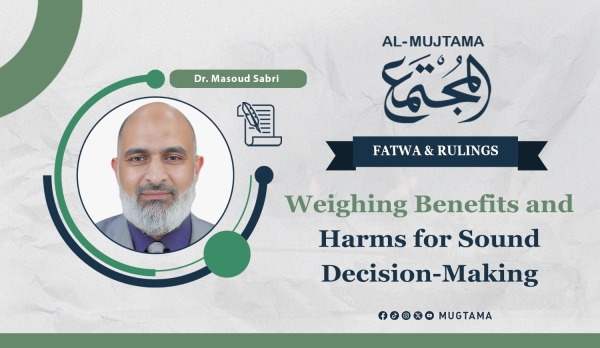Weighing Benefits and Harms for Sound Decision-Making
Jurisprudence of Balancing Benefits and Harms (Maslaha and Mafsada)
This principle lies at the core of Islamic political jurisprudence, particularly given the scarcity of explicit textual sources on political matters in Islamic law. Since politics revolves around achieving benefits and preventing harms, jurists often differ in their rulings on political issues based on how they assess these factors. However, the greater problem is that many scholars fail to accurately rank and prioritize benefits and harms, especially in political affairs. This leads to errors in their ijtihad (independent reasoning) on such matters. In fact, few jurists today are truly qualified to engage in this field, as most political fatwas tend to be superficial and lack depth.
Ranking of Benefits and Harms:
Classical scholars emphasized that benefits (masalih) and harms (mafasid) have different levels. Benefits can be classified into good (hasan), better (ahsan), virtuous (fadıl), and most virtuous (afdhal), while harms can be categorized as bad (qabih), worse (aqbah), lowly (radhil), and most lowly (aradhil). Each of these categories is further divided into higher, lower, and intermediate levels, which may be equal or unequal in significance.
One of the key principles in ranking benefits and harms is that:
- Obligatory benefits (masalih al-ijab) are superior to recommended benefits (masalih al-nadb).
- Recommended benefits are superior to permissible benefits (masalih al-ibaha).
- Harms that lead to prohibition (mafasid al-tahrim) are worse than harms that lead to mere disapproval (makruh). (1)
Additionally, worldly benefits and harms are often determined through experience and societal customs. (2) However, not all jurists possess the necessary familiarity with such experiences and customs, which can lead to misjudgments.
Weighing and Prioritizing Benefits and Harms:
A fundamental aspect of the jurisprudence of masalih and mafasid is knowing how to weigh and prioritize them. In general, this process follows these principles:
- When there are two benefits, efforts should be made to achieve both. If this is not possible, the greater benefit should take precedence over the lesser one.
- When there are two harms, both should be avoided. If this is not possible, the greater harm should be prevented first.
- When there is a conflict between a benefit and a harm:
- If the benefit outweighs the harm, the focus should be on attaining the greater benefit.
- If the harm outweighs the benefit, the priority should be to avoid the greater harm.
- If the benefit and harm are equal, preventing the harm takes precedence, even if it means sacrificing the benefit.
-------------------------------------------------------------
- Al-Fawāʾid fī Ikhtiṣār al-Maqāṣid, Al-ʿIzz ibn ʿAbd al-Salām, p. 39.
- , p. 41.


